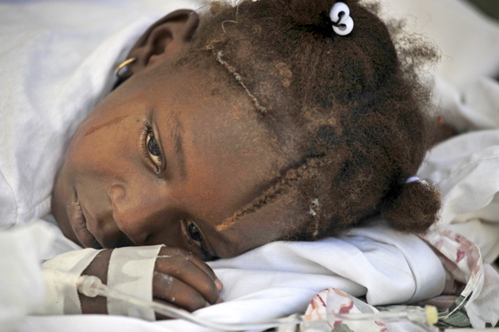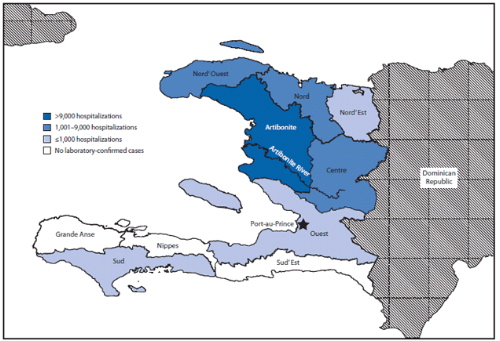
SAINT-MARC, HAITI-- OCTOBER 25, 2010-Evca Dormevil, 5, of Grande-Saline Douin rests on a cot with tear streaked cheeks as she receives fluids through an I.V. in a make-shift ward in the courtyard at St. Nicholas Hospital in Saint-Marc, Haiti. Photo By Leah Millis
In a last minute State Department press briefing today, Mark Ward expressed confidence in the Haitian government's anti-cholera efforts even though the number of cases and deaths continue to rise. Ward is Acting Director of the Office of U.S. Foreign Disaster Assistance at the U.S. Agency for International Development (USAID). "Let me begin by expressing a lot of confidence in the efforts that the Government of Haiti has undertaken in treating the disease from what we've seen so far," Ward said.
Ward's statement flies in the face of common sense and reason given the Haitian government's dismal response to the January 2010 earthquake which has left parts of the country in ruins and at least 1.3 million displaced in festering cesspools of tarp cities. Men, women, and children continue to live in filthy, life-threatening conditions--conditions which have provided a fertile breeding ground for the cholera epidemic which has now claimed over 1,000 lives and 16,000 victims in seven of the country's ten regions, or departments.

Violent demonstrations are continuing this week over the lack of government response to Haitians' increasingly dire situation and continued denials by the United Nations that the source of the outbreak is a UN camp near Mirebalais on the Artibonite River. The Artibonite region is the epicenter of the cholera epidemic.
Officials in today's State Department briefing contradicted themselves by first saying it was unexpected that cholera would break out in Artibonite--they expected diarrheal disease, but certainly not cholera, in Port-au-Prince. "The disease fooled us."
The U.S. Centers for Disease Control liaison to USAID on the cholera outbreak, Menoj Menon, said Haiti was especially vulnerable because it was cholera-free for decades and the population lacked any natural immunity.
Responding to a question about contagion origins in the Nepalese camp Menon said, "We can't rule in or rule out either scenario. The CDC, in conjunction with the laboratory in Haiti, are conducting a variety of laboratory tests to further characterize the strain of cholera. But again, with global trade, with global movement of the population, it - we'll never know how the strain arrived in Haiti."
One has to wonder of Menon has read the latest CDC bulletin.
In its latest report, the Centers for Disease Control (CDC) has determined that "one event" caused the outbreak in rice farmers living in the Artibonite River Valley, and immediately downstream from the suspected source at the Nepalese camp. There was an outbreak of the same strain of cholera in Nepal immediately prior to the deployment of the Nepalese soldiers.
As of November 13, data indicated that a single strain caused illness among the 14 persons from Artibonite Department. If these isolates are representative of those currently circulating in Haiti, the findings suggest that V. cholerae was likely introduced into Haiti in one event. V. cholerae strains that are indistinguishable from the outbreak strain by all methods used have previously been found in countries in South Asia and elsewhere. PFGE analysis on isolates obtained from cholera patients who became ill in other departments in Haiti is ongoing.
In October, the investigative team used a standardized questionnaire to interview 27 patients in the five hospitals in Artibonite Department. "Most of these patients resided or worked in rice fields in communities located alongside a stretch of the Artibonite River approximately 20 miles long," the report says.
The UN continues to deny culpability and the State Department is couching its diplomatic words very carefully.
In spite of these denials, a Swiss diplomat and a French epidemiologist are publicly implicating the Nepalese UN camp.
Nigel Fisher, humanitarian director for the UN, told reporters that a French epidemiologist is implicating the Nepalese camp. "Yesterday I learned there was a French epidemiologist who, with a different methodology, is pointing more clearly at the Nepalese," Fisher said in a CBC interview.
(Note: You can view every article as one long page if you sign up as an Advocate Member, or higher).





